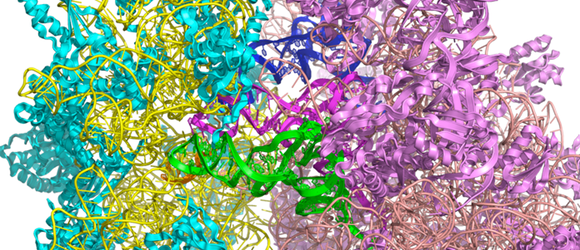
I. Mechanistic Studies of Protein Synthesis
Protein synthesis is a fundamental process in all living organisms. Ribosomes are the ribonucleoprotein complexes responsible for protein synthesis. Crystal structures of the ribosome provide a unique opportunity for understanding the mechanism by which ribosomes perform the complex task of protein synthesis. We have developed powerful biochemical, biophysical and genetic tools to study specific steps in translation. Our studies will provide a better understanding of this vital cellular process and help in the design of novel antibiotics to treat bacterial infections. Bacterial ribosomes are the target for inactivation by several classes of antibiotics. In fact, more than two-thirds of the currently prescribed antibiotics target bacterial ribosomes. Bacteria cause numerous diseases such as tuberculosis, meningitis, pneumonia, leprosy, typhoid, cholera, and bubonic plague. Antibiotic-resistant strains of bacteria are on the rise, causing a crisis in the management and treatment of these infections throughout the world. Understanding the mechanism of translation is crucial for developing more effective antibiotics that target the ribosome of these drug-resistant strains of bacteria.
II. Translational Control in the Brain
Posttranscriptional mechanisms for regulating gene expression such as splicing, mRNA transport, mRNA stability and translation play a critical role in the normal development and function of the nervous system. Moreover, new protein synthesis in activated neurons has long been recognized as essential for learning and memory. Localized protein synthesis alters the structure and functional properties of activated synapses and this is essential for long term memory formation. It is not clear how protein synthesis is regulated at the synapse. As a step towards understanding the role of translational control in the brain we are studying Fragile X Syndrome (FXS), the most common form of inherited mental retardation. FXS is caused by the functional loss of the RNA binding protein, Fragile X Mental Retardation Protein (FMRP). FMRP binds to about 4% of brain mRNAs and repress their translation. Studies suggest that FMRP recognizes specific sequences in the mRNA. MicroRNAs may also be involved in FMRP-dependent repression of translation. We are interested in dissecting the mechanism of translational control by FMRP. These studies will provide insights into the role played by FMRP and other RNA-binding proteins in regulating the synthesis of proteins that are critical for the normal function of the nervous system.
III. Translational Control by Viruses
All viruses use the protein synthesis machinery of the host cell to synthesize viral proteins. Many viruses such as influenza, polio, HIV and HCV have evolved sophisticated mechanisms to temporally regulate the expression of viral genes to successfully multiply in the host cell. We are focusing on influenza virus, which causes seasonal flu. During severe flu epidemics, influenza virus is responsible for about 52,000 deaths a year in the United States alone and more than 20 million worldwide. In addition, influenza virus can rapidly mutate into highly virulent strains threatening large populations as seen recently with the bird flu and swine flu pandemics. We are interested in understanding how influenza virus is able to hijack the protein synthesis machinery of the host cell to predominantly translate viral mRNAs. Understanding the mechanisms used by influenza virus to translate viral mRNAs will provide insights for developing novel antiviral therapeutics.
IV. Artificial Cells
We are part of a multidisciplinary group interested in using a bottom-up approach to create hybrid artificial cells that mimic the function of natural cells. The group consist of UCSD researchers Neal Devaraj, Jeff Hasty, Lev Tsimring, and Simpson Joseph, and Vinothan Manoharan at Harvard, and Christopher Bowman at the University of Colorado, Boulder. The project is funded by a DOD - MURI Award. Our goal is to establish a robust gene expression platform inside synthetic vesicles to explore how genetic circuits perform in an artificial system. These studies will lead to the design of advanced artificial cells that could be used to produce drugs or fuels. For more information click on the link below.
Link to Artificial Cell MURI website.
Openings
Postdoctoral Positions: We are seeking talented postdoctoral fellows to study the mechanism of translation and translational regulation. Applicants must have a recent Ph.D. and expertise in molecular biology with publications in international peer-reviewed journals. Highly motivated applicants with experience in RNA biochemistry, enzyme kinetics, quantitative biology, and structure-function analysis are invited to apply. Please send curriculum vitae and the names of three references to: sjoseph@ucsd.edu
Graduate Students: Biology, biochemistry and biophysics students interested in ribosome structure and function and mechanism of gene expression are encouraged to contact Dr. Simpson Joseph.
Undergraduate Research Experience: Openings are available for Chem199 students interested in gaining research experience. The student must have a background in biochemistry and capable of working independently.
